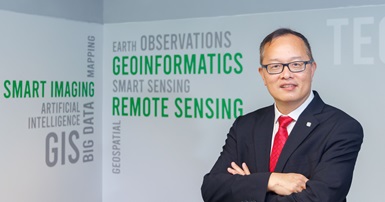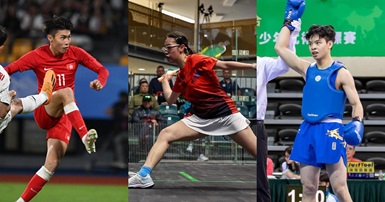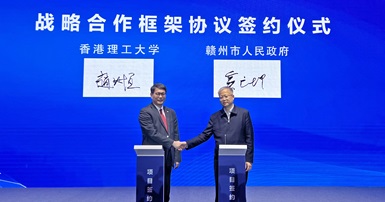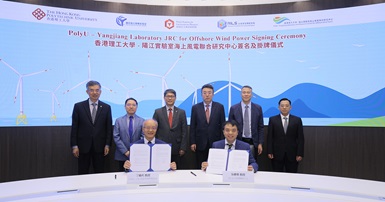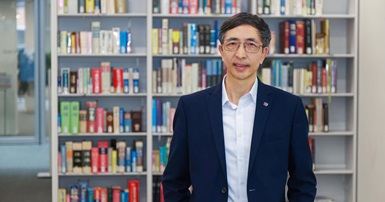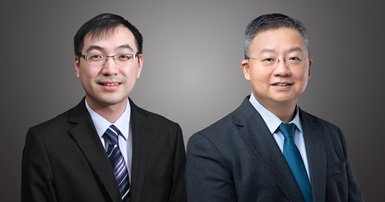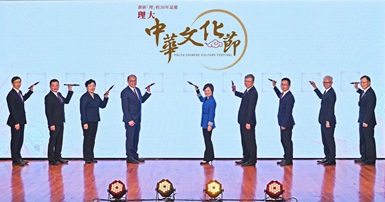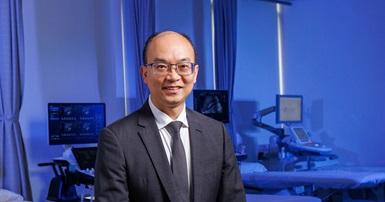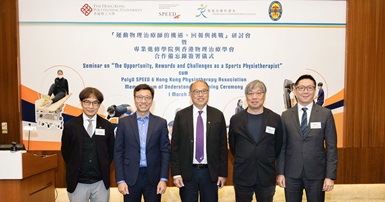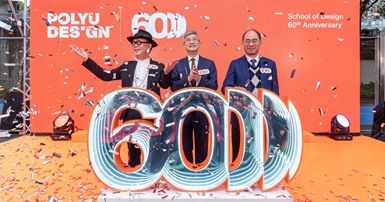PolyU launches Chinese Culture Festival empowering younger generation with cultural confidence and promoting vibrant traditions of Chinese culture
The Hong Kong Polytechnic University (PolyU) is committed to promoting the rich traditions of Chinese culture and, to this end, last year established the Research Centre for Chinese History and Culture to facilitate promotion of Chinese history and cultural education on campus. This year, the University is organising the “PolyU Chinese Culture Festival” to showcase the beauty and significance of various aspects of Chinese culture, cultivate a deeper appreciation of Chinese heritage, strengthen a sense of pride and belonging to the Nation among the younger generation, and contribute to the development of Hong Kong into an East-meets-West centre for international cultural exchange.
As part of the celebratory events commemorating the 30th anniversary of PolyU achieving university status, the University today hosted the Opening Ceremony of the PolyU Chinese Culture Festival. The Ceremony was officiated by Dr CHOI Yuk-lin, Secretary for Education of the HKSAR.
She was joined by Dr LAM Tai-fai, PolyU Council Chairman; Prof. Jin-Guang TENG, PolyU President; Prof. Ben YOUNG, Vice President (Student and Global Affairs); and Prof. LI Ping, Dean of the Faculty of Humanities. Representatives from the co-organisers of the PolyU Chinese Culture Festival, including Ms SHEN Jiang, Secretary of the Party Committee at Tiangong University; Prof. YU Chuang, President of the Zhejiang Industry & Trade Vocational College; and Dr Louis NG, Museum Director of the Hong Kong Palace Museum, also joined them to kick off the Festival.
Dr Choi Yuk-lin emphasised the significance of higher education as a crucial vehicle for inheriting cultural heritage and driving ideological and cultural innovation. It is also an important foundation for upholding the unity of the country and the Nation. Learning, comprehending and inheriting Chinese culture can enhance the youngsters’ national identity, cultural confidence and their sense of belonging to the Nation.
The 20th National Congress of the Communist Party of China report underscored the imperative to reinforce the dissemination and influence of Chinese civilisation, fostering cultural confidence and strength. Additionally, our country’s “14th Five-Year Plan” supports Hong Kong in developing into an East-meets-West centre for international cultural exchange.
She mentioned that PolyU hosts the Chinese Culture Festival and co-organises various exciting activities in collaboration with the Hong Kong Palace Museum, mainland institutions and other arts and culture organisations, providing an invaluable platform to promote mutual cultural learning and exchange. As well as making a contribution to the development of Hong Kong into an East-meets-West centre for international cultural exchange, these efforts aim to ignite a passion for Chinese culture among PolyU faculty members, students, alumni and the broader community, strengthening their sense of belonging to the Nation and cultural confidence.
There will be a series of activities focusing on pottery lacquerware, embroidery, Chinese music, Chinese classics recitation and more. Distinguished scholars, experts and artists will be invited on campus to exhibit the unique artistic charm of Chinese culture through exhibitions, lectures, workshops and musical performance.
Dr Lam Tai-fai stated that guided by its motto “To learn and to apply, for the benefit of mankind,” PolyU was committed to nurturing students who possess a strong sense of national identity and a positive mindset. The University would continue to promote Chinese culture and contribute to the development of Hong Kong into an East-meets-West centre for international cultural exchange, while providing full support to the City in integrating itself into the overall development of the Nation.
Prof. Jin-Guang Teng said, “The ‘Chinese Culture Festival’ is a profoundly significant endeavour for us in terms of nurturing graduates with both ability and moral integrity. It aims to deepen the understanding of Chinese culture among the younger generation and wider society, to foster their pride and sense of belonging to the Nation, as well as to bolster their cultural confidence and patriotic sentiments.”
Prof. Ben Young, who also serves as Chairman of the PolyU Chinese Culture Festival, thanked the broader community for their support of PolyU. He hoped that through the series of stimulating activities, students could deepen their knowledge and understanding of Chinese culture.
During the next two weeks, until 27 March, PolyU will be collaborating with Tiangong University’s International Innovation Centre of Chinese Traditional Culture and Artistry Inheritance to co-organise an exhibition on campus showcasing intangible cultural heritage from Tianjin. Eight artists from Tianjin have been invited to exhibit their artworks, including HuLian Art Studio (Prof. Zheng Yong’s Studio), the City’s three unique intangible cultural heritages: Clay Figurines Zhang, Tianjin Kite Wei and Yucheng Hao New Year Painting, as well as other intangible cultural heritages at national, provincial and municipal levels such as Hezhen Handmade Incense, Guanzhao Xuan Ceramic Painting, Zhao’s Gourd-making and Tianjin Musical Instruments Zhang.
The exhibition will also highlight a collection of selected works of Wenzhou embroidery, which is also recognised as a national intangible cultural heritage. In addition to the large-scale exhibition, there will be expert lectures, workshops and guided tours, all of which will be open to PolyU students, staff, alumni and the public free of charge.
After the Opening Ceremony, Memoranda of Understanding (MoU) were signed between PolyU and Tiangong University to reinforce academic exchange and collaboration on scientific research projects. Witnessed by Dr Lam Tai-fai and Ms Shen Jiang, the MoU were signed respectively by Prof. Li Ping and Prof. JIANG Yaming, Dean of the School of International Education and Director of Hong Kong, Macao and Taiwan Affairs Office of Tiangong University, as well as Prof. Erin CHO, Dean of the School of Fashion and Textiles; and Prof. GONG Jixian, Associate Dean of the School of Textile Science and Engineering of Tiangong University.
Witnessed by Dr Lam Tai-fai, PolyU Council Chairman (back row, left); and Ms Shen Jiang, Secretary of the Party Committee at Tiangong University (back row, right), the MoU was signed by Prof. Li Ping, Dean of the Faculty of Humanities of PolyU (front row, left); and Prof. Jiang Yaming, Dean of the School of International Education and Director of Hong Kong, Macao and Taiwan Affairs Office of Tiangong University (front row, right), to reinforce academic exchange and collaboration on scientific research projects.
Witnessed by Dr Lam Tai-fai, PolyU Council Chairman (back row, left); and Ms Shen Jiang, Secretary of the Party Committee at Tiangong University (back row, right), the MoU was signed by Prof. Erin Cho, Dean of the School of Fashion and Textiles of PolyU (front row, left); and Prof. Gong Jixian, Associate Dean of the School of Textile Science and Engineering of Tiangong University (front row, right), to reinforce academic exchange and collaboration on scientific research projects.
To find out more about the PolyU Chinese Culture Festival, please visit: https://polyu.me/PolyU-Chinese-Culture-Festival (Chinese only). For details about the activities in March, please click here (Chinese only).
Activity Highlights (March and April)
*** END ***
Events
Communications and Public Affairs Office
